Importance of Communication Skills in Nursing: An Essay
VerifiedAdded on 2022/10/14
|7
|1775
|76
Essay
AI Summary
This essay delves into the critical role of interpersonal communication skills in the nursing profession. It emphasizes the significance of listening, feedback, and questioning as essential tools for effective patient care and improved healthcare outcomes. The essay begins by defining interpersonal communication and then explores the importance of active listening in understanding patients' medical histories, observing non-verbal cues, and making informed diagnostic and treatment decisions. It then examines the role of feedback in assessing patient progress, bridging performance gaps, and fostering reflective learning among healthcare professionals. Furthermore, the essay highlights the importance of effective questioning techniques in gathering patient information, understanding community health needs, and facilitating learning for nursing students. Through a detailed analysis of these communication skills, the essay underscores their impact on creating a positive healthcare environment, enhancing patient-nurse relationships, and ultimately improving the quality of care. The essay also adheres to academic standards, including proper referencing and a minimum of eight academic sources, showcasing a solid understanding of communication theory and research processes.
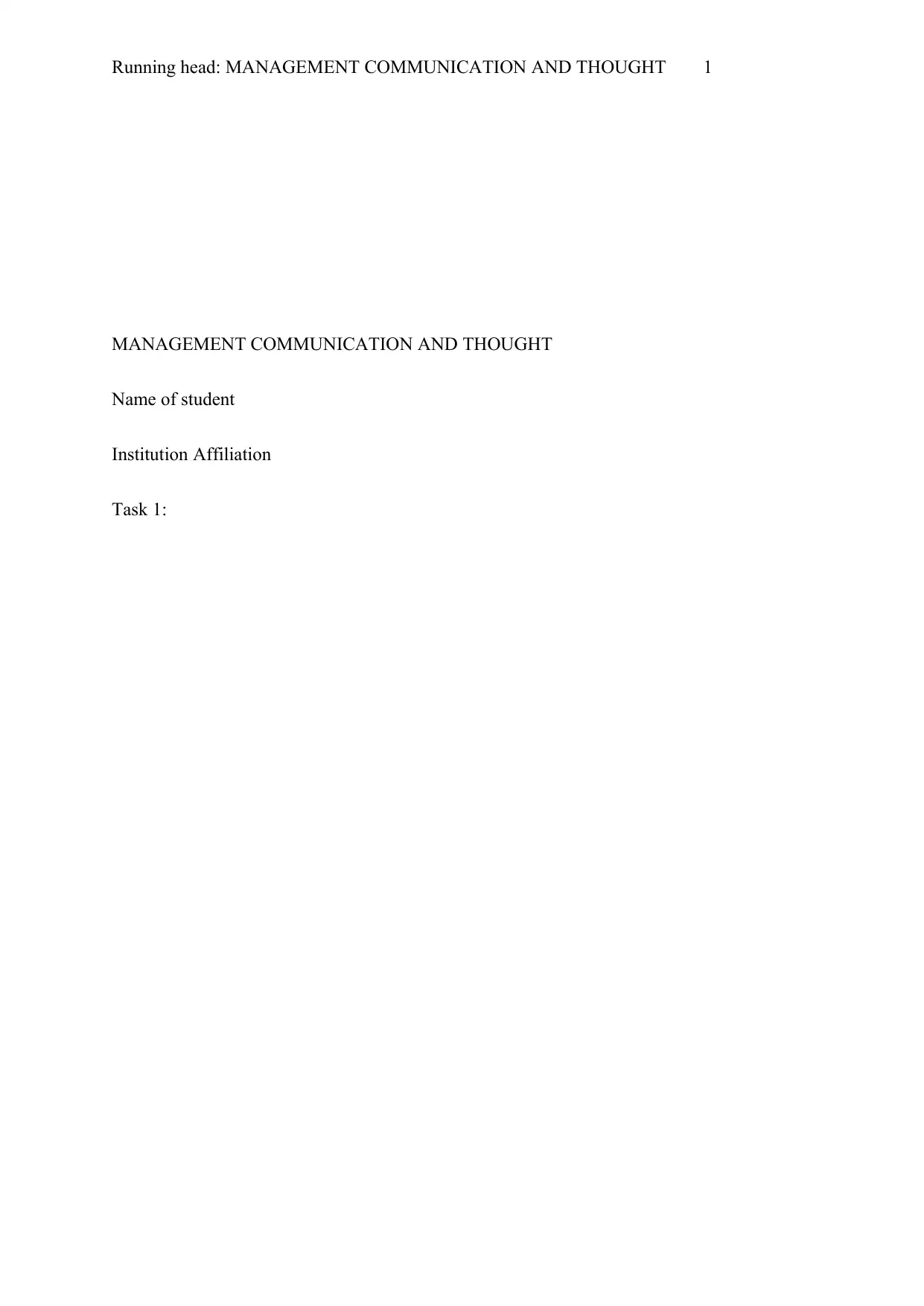
Running head: MANAGEMENT COMMUNICATION AND THOUGHT 1
MANAGEMENT COMMUNICATION AND THOUGHT
Name of student
Institution Affiliation
Task 1:
MANAGEMENT COMMUNICATION AND THOUGHT
Name of student
Institution Affiliation
Task 1:
Paraphrase This Document
Need a fresh take? Get an instant paraphrase of this document with our AI Paraphraser
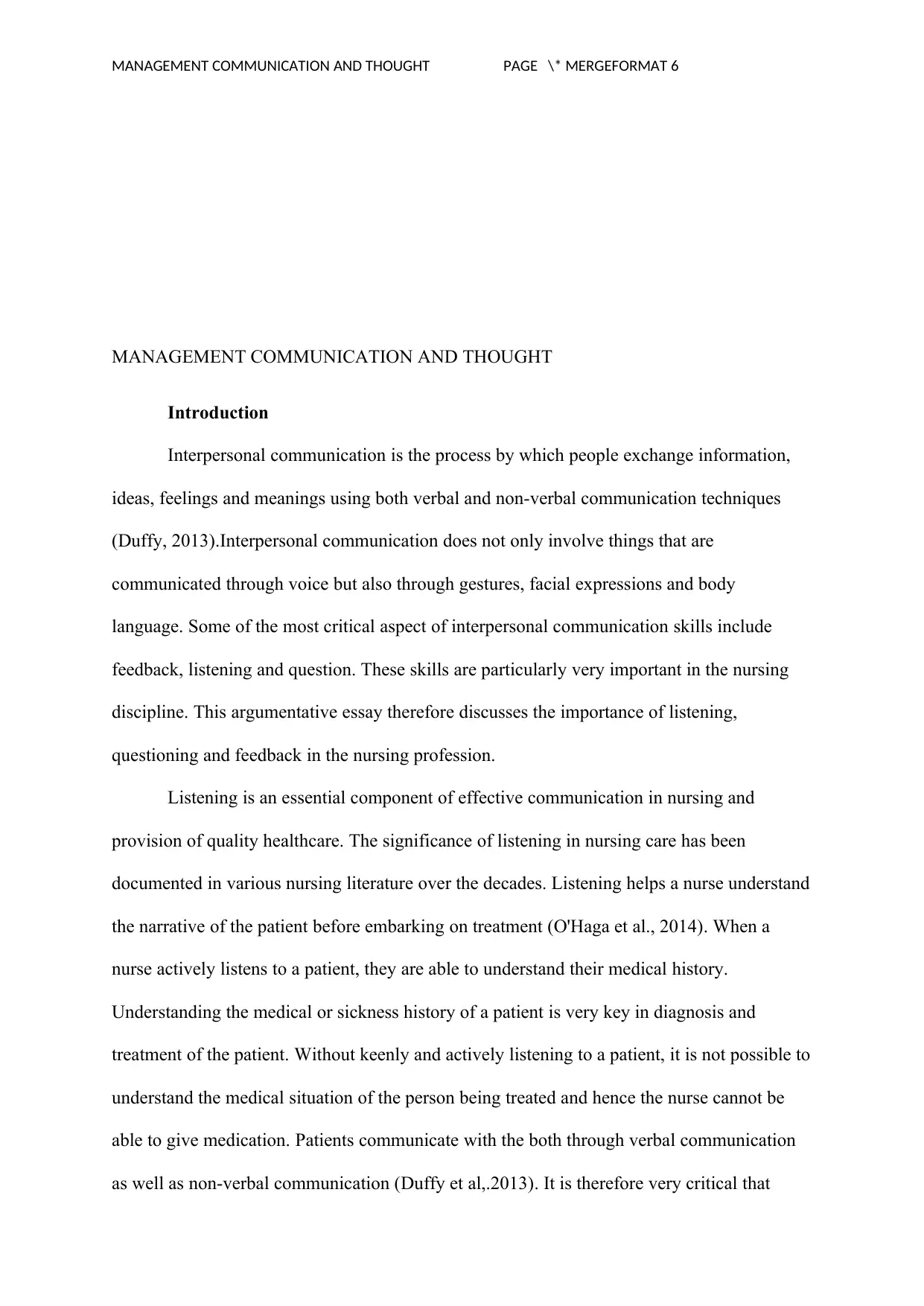
MANAGEMENT COMMUNICATION AND THOUGHT PAGE \* MERGEFORMAT 6
MANAGEMENT COMMUNICATION AND THOUGHT
Introduction
Interpersonal communication is the process by which people exchange information,
ideas, feelings and meanings using both verbal and non-verbal communication techniques
(Duffy, 2013).Interpersonal communication does not only involve things that are
communicated through voice but also through gestures, facial expressions and body
language. Some of the most critical aspect of interpersonal communication skills include
feedback, listening and question. These skills are particularly very important in the nursing
discipline. This argumentative essay therefore discusses the importance of listening,
questioning and feedback in the nursing profession.
Listening is an essential component of effective communication in nursing and
provision of quality healthcare. The significance of listening in nursing care has been
documented in various nursing literature over the decades. Listening helps a nurse understand
the narrative of the patient before embarking on treatment (O'Haga et al., 2014). When a
nurse actively listens to a patient, they are able to understand their medical history.
Understanding the medical or sickness history of a patient is very key in diagnosis and
treatment of the patient. Without keenly and actively listening to a patient, it is not possible to
understand the medical situation of the person being treated and hence the nurse cannot be
able to give medication. Patients communicate with the both through verbal communication
as well as non-verbal communication (Duffy et al,.2013). It is therefore very critical that
MANAGEMENT COMMUNICATION AND THOUGHT
Introduction
Interpersonal communication is the process by which people exchange information,
ideas, feelings and meanings using both verbal and non-verbal communication techniques
(Duffy, 2013).Interpersonal communication does not only involve things that are
communicated through voice but also through gestures, facial expressions and body
language. Some of the most critical aspect of interpersonal communication skills include
feedback, listening and question. These skills are particularly very important in the nursing
discipline. This argumentative essay therefore discusses the importance of listening,
questioning and feedback in the nursing profession.
Listening is an essential component of effective communication in nursing and
provision of quality healthcare. The significance of listening in nursing care has been
documented in various nursing literature over the decades. Listening helps a nurse understand
the narrative of the patient before embarking on treatment (O'Haga et al., 2014). When a
nurse actively listens to a patient, they are able to understand their medical history.
Understanding the medical or sickness history of a patient is very key in diagnosis and
treatment of the patient. Without keenly and actively listening to a patient, it is not possible to
understand the medical situation of the person being treated and hence the nurse cannot be
able to give medication. Patients communicate with the both through verbal communication
as well as non-verbal communication (Duffy et al,.2013). It is therefore very critical that
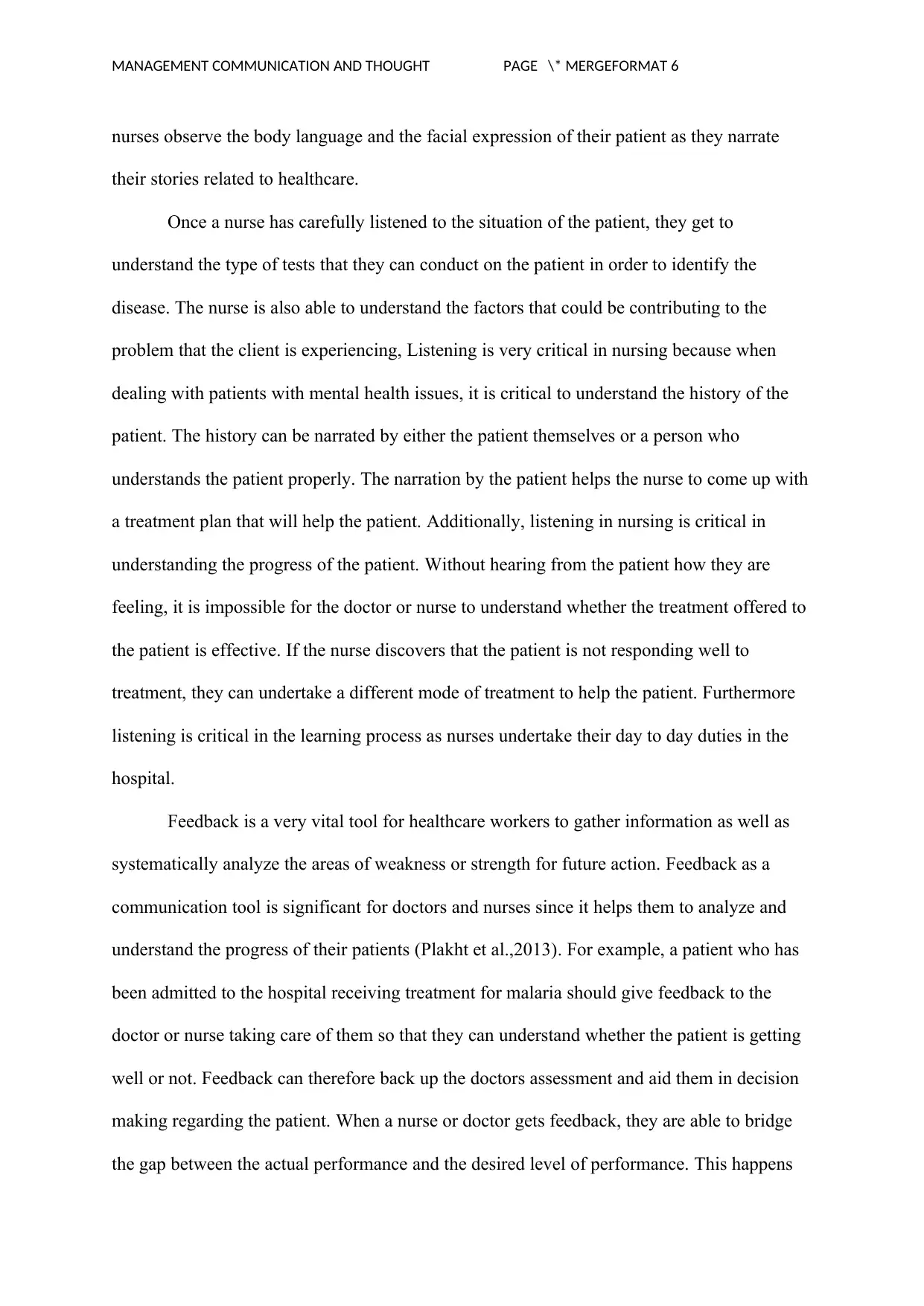
MANAGEMENT COMMUNICATION AND THOUGHT PAGE \* MERGEFORMAT 6
nurses observe the body language and the facial expression of their patient as they narrate
their stories related to healthcare.
Once a nurse has carefully listened to the situation of the patient, they get to
understand the type of tests that they can conduct on the patient in order to identify the
disease. The nurse is also able to understand the factors that could be contributing to the
problem that the client is experiencing, Listening is very critical in nursing because when
dealing with patients with mental health issues, it is critical to understand the history of the
patient. The history can be narrated by either the patient themselves or a person who
understands the patient properly. The narration by the patient helps the nurse to come up with
a treatment plan that will help the patient. Additionally, listening in nursing is critical in
understanding the progress of the patient. Without hearing from the patient how they are
feeling, it is impossible for the doctor or nurse to understand whether the treatment offered to
the patient is effective. If the nurse discovers that the patient is not responding well to
treatment, they can undertake a different mode of treatment to help the patient. Furthermore
listening is critical in the learning process as nurses undertake their day to day duties in the
hospital.
Feedback is a very vital tool for healthcare workers to gather information as well as
systematically analyze the areas of weakness or strength for future action. Feedback as a
communication tool is significant for doctors and nurses since it helps them to analyze and
understand the progress of their patients (Plakht et al.,2013). For example, a patient who has
been admitted to the hospital receiving treatment for malaria should give feedback to the
doctor or nurse taking care of them so that they can understand whether the patient is getting
well or not. Feedback can therefore back up the doctors assessment and aid them in decision
making regarding the patient. When a nurse or doctor gets feedback, they are able to bridge
the gap between the actual performance and the desired level of performance. This happens
nurses observe the body language and the facial expression of their patient as they narrate
their stories related to healthcare.
Once a nurse has carefully listened to the situation of the patient, they get to
understand the type of tests that they can conduct on the patient in order to identify the
disease. The nurse is also able to understand the factors that could be contributing to the
problem that the client is experiencing, Listening is very critical in nursing because when
dealing with patients with mental health issues, it is critical to understand the history of the
patient. The history can be narrated by either the patient themselves or a person who
understands the patient properly. The narration by the patient helps the nurse to come up with
a treatment plan that will help the patient. Additionally, listening in nursing is critical in
understanding the progress of the patient. Without hearing from the patient how they are
feeling, it is impossible for the doctor or nurse to understand whether the treatment offered to
the patient is effective. If the nurse discovers that the patient is not responding well to
treatment, they can undertake a different mode of treatment to help the patient. Furthermore
listening is critical in the learning process as nurses undertake their day to day duties in the
hospital.
Feedback is a very vital tool for healthcare workers to gather information as well as
systematically analyze the areas of weakness or strength for future action. Feedback as a
communication tool is significant for doctors and nurses since it helps them to analyze and
understand the progress of their patients (Plakht et al.,2013). For example, a patient who has
been admitted to the hospital receiving treatment for malaria should give feedback to the
doctor or nurse taking care of them so that they can understand whether the patient is getting
well or not. Feedback can therefore back up the doctors assessment and aid them in decision
making regarding the patient. When a nurse or doctor gets feedback, they are able to bridge
the gap between the actual performance and the desired level of performance. This happens
⊘ This is a preview!⊘
Do you want full access?
Subscribe today to unlock all pages.

Trusted by 1+ million students worldwide
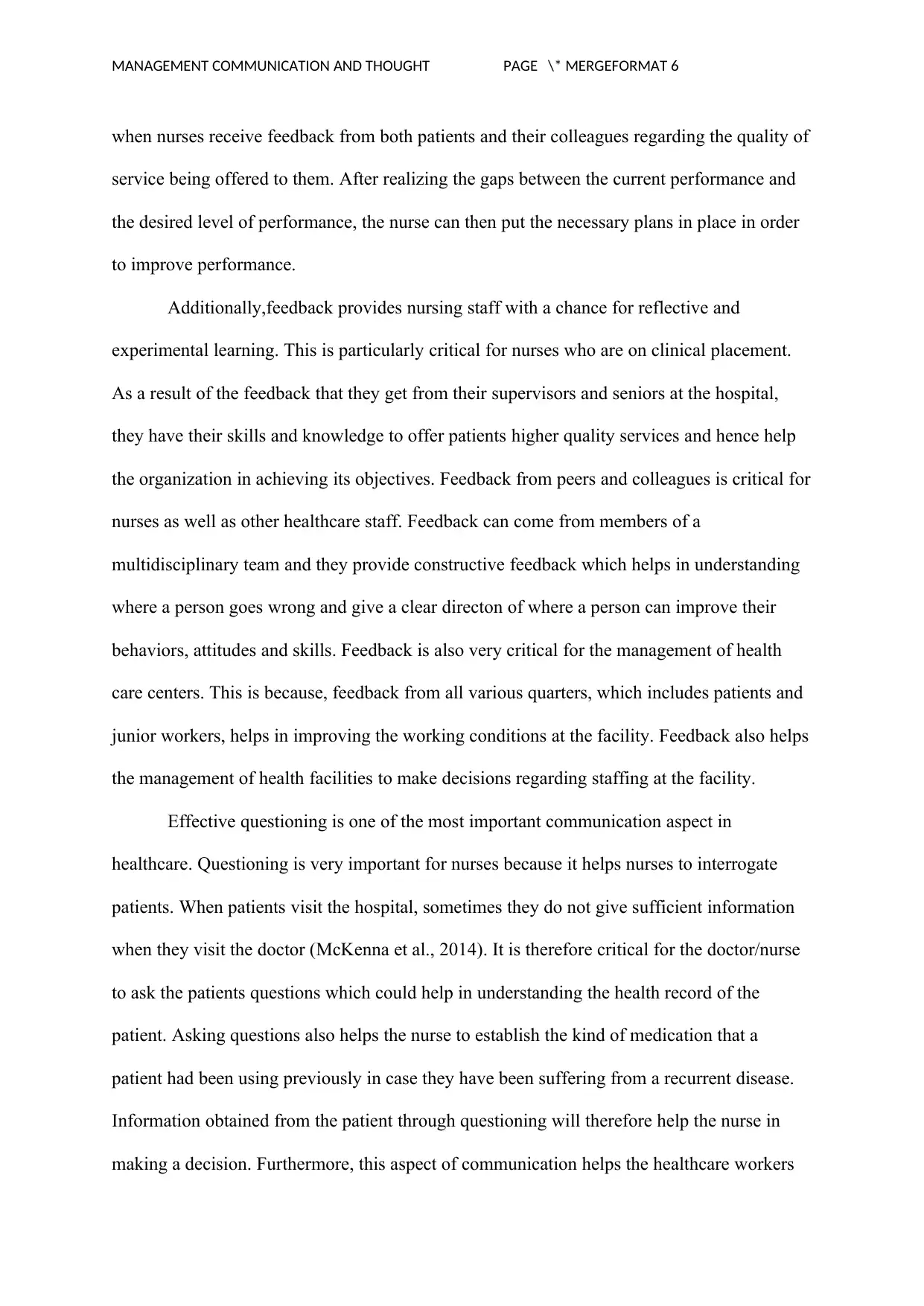
MANAGEMENT COMMUNICATION AND THOUGHT PAGE \* MERGEFORMAT 6
when nurses receive feedback from both patients and their colleagues regarding the quality of
service being offered to them. After realizing the gaps between the current performance and
the desired level of performance, the nurse can then put the necessary plans in place in order
to improve performance.
Additionally,feedback provides nursing staff with a chance for reflective and
experimental learning. This is particularly critical for nurses who are on clinical placement.
As a result of the feedback that they get from their supervisors and seniors at the hospital,
they have their skills and knowledge to offer patients higher quality services and hence help
the organization in achieving its objectives. Feedback from peers and colleagues is critical for
nurses as well as other healthcare staff. Feedback can come from members of a
multidisciplinary team and they provide constructive feedback which helps in understanding
where a person goes wrong and give a clear directon of where a person can improve their
behaviors, attitudes and skills. Feedback is also very critical for the management of health
care centers. This is because, feedback from all various quarters, which includes patients and
junior workers, helps in improving the working conditions at the facility. Feedback also helps
the management of health facilities to make decisions regarding staffing at the facility.
Effective questioning is one of the most important communication aspect in
healthcare. Questioning is very important for nurses because it helps nurses to interrogate
patients. When patients visit the hospital, sometimes they do not give sufficient information
when they visit the doctor (McKenna et al., 2014). It is therefore critical for the doctor/nurse
to ask the patients questions which could help in understanding the health record of the
patient. Asking questions also helps the nurse to establish the kind of medication that a
patient had been using previously in case they have been suffering from a recurrent disease.
Information obtained from the patient through questioning will therefore help the nurse in
making a decision. Furthermore, this aspect of communication helps the healthcare workers
when nurses receive feedback from both patients and their colleagues regarding the quality of
service being offered to them. After realizing the gaps between the current performance and
the desired level of performance, the nurse can then put the necessary plans in place in order
to improve performance.
Additionally,feedback provides nursing staff with a chance for reflective and
experimental learning. This is particularly critical for nurses who are on clinical placement.
As a result of the feedback that they get from their supervisors and seniors at the hospital,
they have their skills and knowledge to offer patients higher quality services and hence help
the organization in achieving its objectives. Feedback from peers and colleagues is critical for
nurses as well as other healthcare staff. Feedback can come from members of a
multidisciplinary team and they provide constructive feedback which helps in understanding
where a person goes wrong and give a clear directon of where a person can improve their
behaviors, attitudes and skills. Feedback is also very critical for the management of health
care centers. This is because, feedback from all various quarters, which includes patients and
junior workers, helps in improving the working conditions at the facility. Feedback also helps
the management of health facilities to make decisions regarding staffing at the facility.
Effective questioning is one of the most important communication aspect in
healthcare. Questioning is very important for nurses because it helps nurses to interrogate
patients. When patients visit the hospital, sometimes they do not give sufficient information
when they visit the doctor (McKenna et al., 2014). It is therefore critical for the doctor/nurse
to ask the patients questions which could help in understanding the health record of the
patient. Asking questions also helps the nurse to establish the kind of medication that a
patient had been using previously in case they have been suffering from a recurrent disease.
Information obtained from the patient through questioning will therefore help the nurse in
making a decision. Furthermore, this aspect of communication helps the healthcare workers
Paraphrase This Document
Need a fresh take? Get an instant paraphrase of this document with our AI Paraphraser
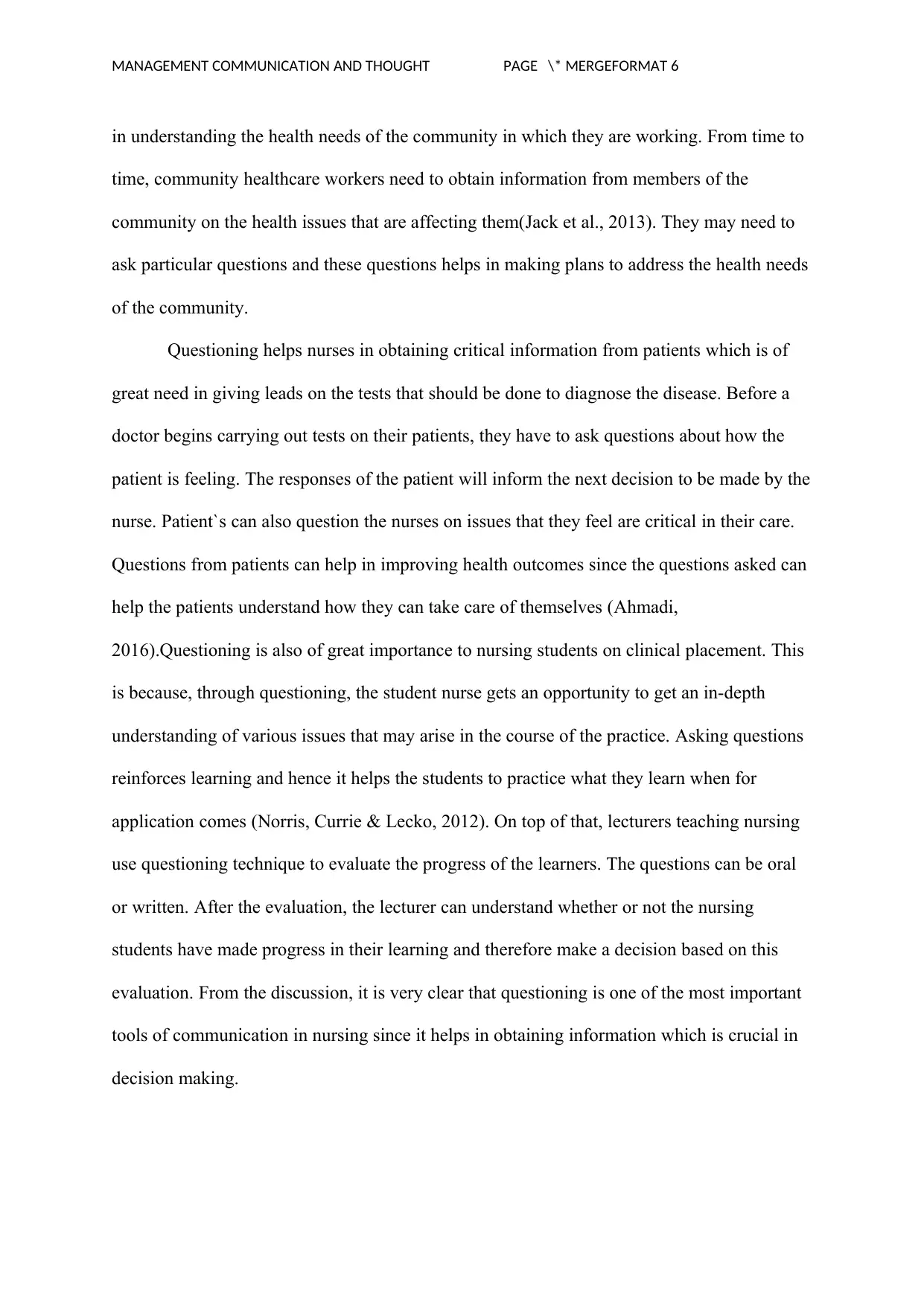
MANAGEMENT COMMUNICATION AND THOUGHT PAGE \* MERGEFORMAT 6
in understanding the health needs of the community in which they are working. From time to
time, community healthcare workers need to obtain information from members of the
community on the health issues that are affecting them(Jack et al., 2013). They may need to
ask particular questions and these questions helps in making plans to address the health needs
of the community.
Questioning helps nurses in obtaining critical information from patients which is of
great need in giving leads on the tests that should be done to diagnose the disease. Before a
doctor begins carrying out tests on their patients, they have to ask questions about how the
patient is feeling. The responses of the patient will inform the next decision to be made by the
nurse. Patient`s can also question the nurses on issues that they feel are critical in their care.
Questions from patients can help in improving health outcomes since the questions asked can
help the patients understand how they can take care of themselves (Ahmadi,
2016).Questioning is also of great importance to nursing students on clinical placement. This
is because, through questioning, the student nurse gets an opportunity to get an in-depth
understanding of various issues that may arise in the course of the practice. Asking questions
reinforces learning and hence it helps the students to practice what they learn when for
application comes (Norris, Currie & Lecko, 2012). On top of that, lecturers teaching nursing
use questioning technique to evaluate the progress of the learners. The questions can be oral
or written. After the evaluation, the lecturer can understand whether or not the nursing
students have made progress in their learning and therefore make a decision based on this
evaluation. From the discussion, it is very clear that questioning is one of the most important
tools of communication in nursing since it helps in obtaining information which is crucial in
decision making.
in understanding the health needs of the community in which they are working. From time to
time, community healthcare workers need to obtain information from members of the
community on the health issues that are affecting them(Jack et al., 2013). They may need to
ask particular questions and these questions helps in making plans to address the health needs
of the community.
Questioning helps nurses in obtaining critical information from patients which is of
great need in giving leads on the tests that should be done to diagnose the disease. Before a
doctor begins carrying out tests on their patients, they have to ask questions about how the
patient is feeling. The responses of the patient will inform the next decision to be made by the
nurse. Patient`s can also question the nurses on issues that they feel are critical in their care.
Questions from patients can help in improving health outcomes since the questions asked can
help the patients understand how they can take care of themselves (Ahmadi,
2016).Questioning is also of great importance to nursing students on clinical placement. This
is because, through questioning, the student nurse gets an opportunity to get an in-depth
understanding of various issues that may arise in the course of the practice. Asking questions
reinforces learning and hence it helps the students to practice what they learn when for
application comes (Norris, Currie & Lecko, 2012). On top of that, lecturers teaching nursing
use questioning technique to evaluate the progress of the learners. The questions can be oral
or written. After the evaluation, the lecturer can understand whether or not the nursing
students have made progress in their learning and therefore make a decision based on this
evaluation. From the discussion, it is very clear that questioning is one of the most important
tools of communication in nursing since it helps in obtaining information which is crucial in
decision making.
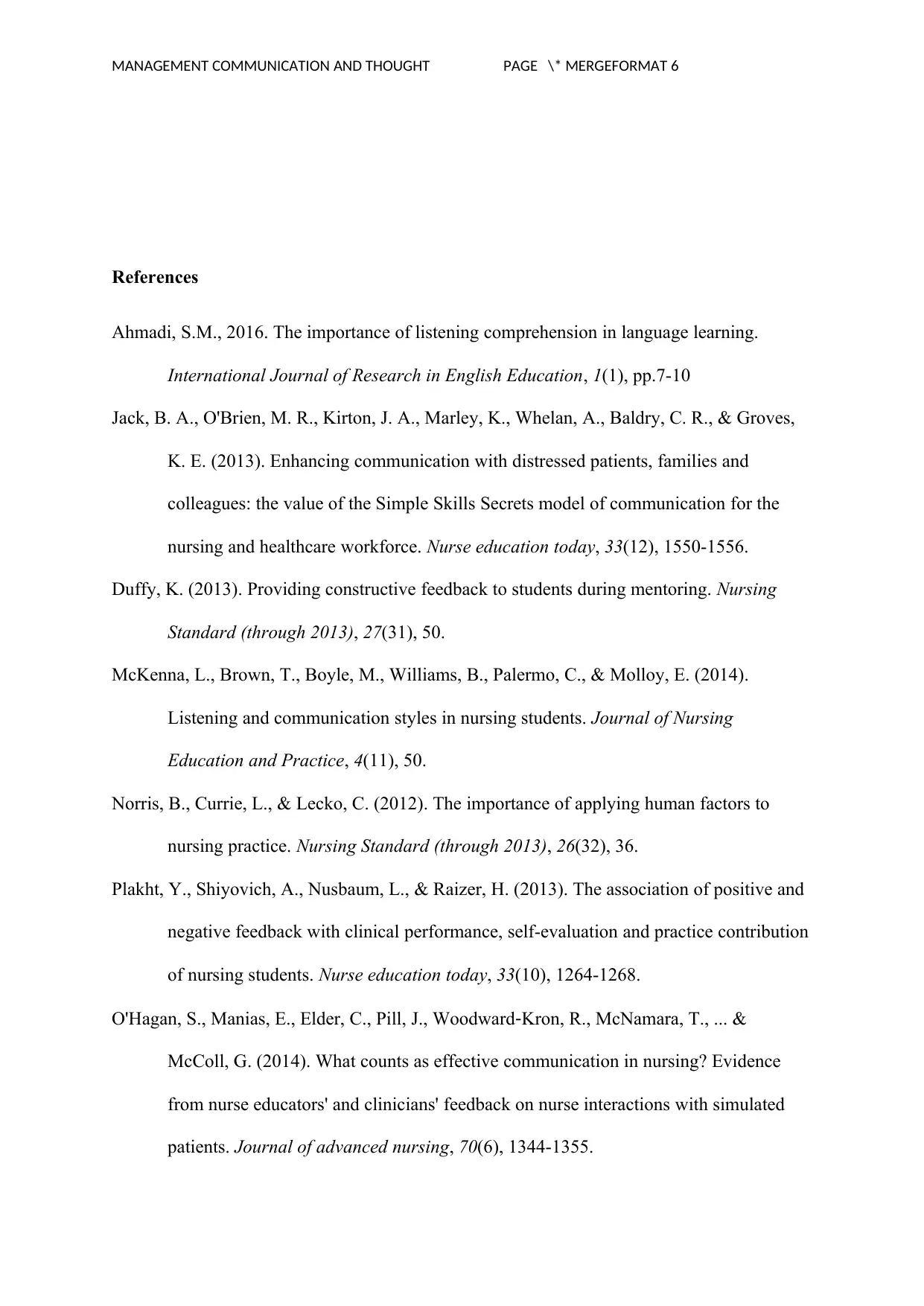
MANAGEMENT COMMUNICATION AND THOUGHT PAGE \* MERGEFORMAT 6
References
Ahmadi, S.M., 2016. The importance of listening comprehension in language learning.
International Journal of Research in English Education, 1(1), pp.7-10
Jack, B. A., O'Brien, M. R., Kirton, J. A., Marley, K., Whelan, A., Baldry, C. R., & Groves,
K. E. (2013). Enhancing communication with distressed patients, families and
colleagues: the value of the Simple Skills Secrets model of communication for the
nursing and healthcare workforce. Nurse education today, 33(12), 1550-1556.
Duffy, K. (2013). Providing constructive feedback to students during mentoring. Nursing
Standard (through 2013), 27(31), 50.
McKenna, L., Brown, T., Boyle, M., Williams, B., Palermo, C., & Molloy, E. (2014).
Listening and communication styles in nursing students. Journal of Nursing
Education and Practice, 4(11), 50.
Norris, B., Currie, L., & Lecko, C. (2012). The importance of applying human factors to
nursing practice. Nursing Standard (through 2013), 26(32), 36.
Plakht, Y., Shiyovich, A., Nusbaum, L., & Raizer, H. (2013). The association of positive and
negative feedback with clinical performance, self-evaluation and practice contribution
of nursing students. Nurse education today, 33(10), 1264-1268.
O'Hagan, S., Manias, E., Elder, C., Pill, J., Woodward‐Kron, R., McNamara, T., ... &
McColl, G. (2014). What counts as effective communication in nursing? Evidence
from nurse educators' and clinicians' feedback on nurse interactions with simulated
patients. Journal of advanced nursing, 70(6), 1344-1355.
References
Ahmadi, S.M., 2016. The importance of listening comprehension in language learning.
International Journal of Research in English Education, 1(1), pp.7-10
Jack, B. A., O'Brien, M. R., Kirton, J. A., Marley, K., Whelan, A., Baldry, C. R., & Groves,
K. E. (2013). Enhancing communication with distressed patients, families and
colleagues: the value of the Simple Skills Secrets model of communication for the
nursing and healthcare workforce. Nurse education today, 33(12), 1550-1556.
Duffy, K. (2013). Providing constructive feedback to students during mentoring. Nursing
Standard (through 2013), 27(31), 50.
McKenna, L., Brown, T., Boyle, M., Williams, B., Palermo, C., & Molloy, E. (2014).
Listening and communication styles in nursing students. Journal of Nursing
Education and Practice, 4(11), 50.
Norris, B., Currie, L., & Lecko, C. (2012). The importance of applying human factors to
nursing practice. Nursing Standard (through 2013), 26(32), 36.
Plakht, Y., Shiyovich, A., Nusbaum, L., & Raizer, H. (2013). The association of positive and
negative feedback with clinical performance, self-evaluation and practice contribution
of nursing students. Nurse education today, 33(10), 1264-1268.
O'Hagan, S., Manias, E., Elder, C., Pill, J., Woodward‐Kron, R., McNamara, T., ... &
McColl, G. (2014). What counts as effective communication in nursing? Evidence
from nurse educators' and clinicians' feedback on nurse interactions with simulated
patients. Journal of advanced nursing, 70(6), 1344-1355.
⊘ This is a preview!⊘
Do you want full access?
Subscribe today to unlock all pages.

Trusted by 1+ million students worldwide
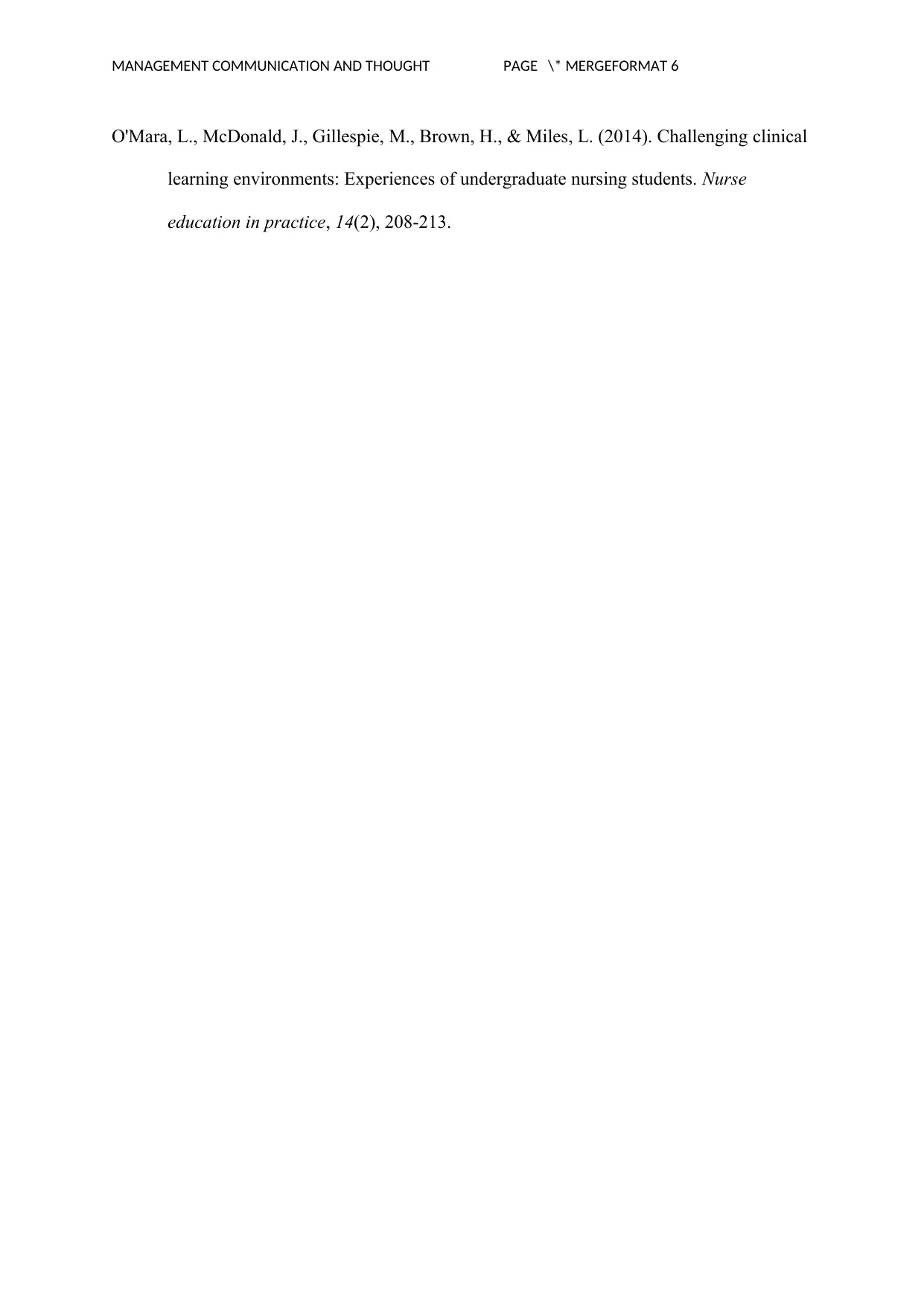
MANAGEMENT COMMUNICATION AND THOUGHT PAGE \* MERGEFORMAT 6
O'Mara, L., McDonald, J., Gillespie, M., Brown, H., & Miles, L. (2014). Challenging clinical
learning environments: Experiences of undergraduate nursing students. Nurse
education in practice, 14(2), 208-213.
O'Mara, L., McDonald, J., Gillespie, M., Brown, H., & Miles, L. (2014). Challenging clinical
learning environments: Experiences of undergraduate nursing students. Nurse
education in practice, 14(2), 208-213.
1 out of 7
Related Documents
Your All-in-One AI-Powered Toolkit for Academic Success.
+13062052269
info@desklib.com
Available 24*7 on WhatsApp / Email
![[object Object]](/_next/static/media/star-bottom.7253800d.svg)
Unlock your academic potential
Copyright © 2020–2026 A2Z Services. All Rights Reserved. Developed and managed by ZUCOL.




